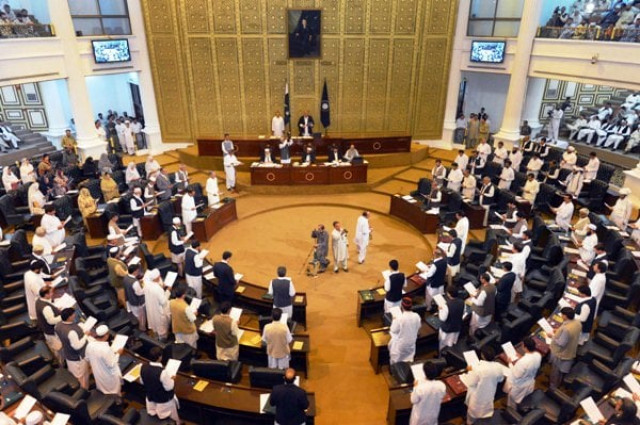Opposition in K-P Assembly urges crackdown on banned outfits
The K-P assembly also passed a resolution demanding a ban on porn sites

K-P Assembly. PHOTO: AFP
The house on Monday approved a bill and passed six resolutions.
During Monday’s session, Leader of the Opposition in Khyber-Pakhtunkhwa (K-P) Assembly Akram Khan Durrani said that the issues faced by the levies personnel have yet to be resolved over nine months after the merger of tribal areas with the province.
This, Durrani said, has caused the law and order situation in the province to deteriorate.
He demanded that the government take the assembly into confidence while making rules for the Levies and Khasadar force.
Continuing the discussion on the law and order issues in the province, former K-P chief minister Durrani asked why the apex committee of the province — the top law and order body — was headed by the governor when the chief minister was its chief executive.
He added that it was the governor who had formed a committee to hold talks with the Pashtun Tahaffuz Movement (PTM) leadership and termed the move as ‘humiliating’.
Durrani, who is aligned with the Jamiat Ulemae-e-Islam Fazl (JUI-F) but had been elected under the united banner of the Muttahida Majlis-e-Amal (MMA) together with the Jamaat-e-Islami (JI), said that his party has a principled stance against the immediate merger of the erstwhile federally administered tribal areas (Fata) since it was still unclear who would head the oversee elections in the tribal districts.
He further warned that the tribal volunteer force of ‘Khasadars’ have threatened to protest from April 3 and suggested that the government urgently resolve their issues through dialogue.
Sardar Hussain Babak, the parliamentary leader of the Awami National Party (ANP), said that the country was under immense international pressure regarding the presence of banned outfits.
He added that the government had taken weapons away from the tribal people, but non-state actors were still armed, he said.
He further suggested that the government do away with the policy of ‘good’ and ‘bad’ Taliban.
The ANP leader also raised the issue of 1,400 differently abled people in South Waziristan, including 450 women, whom the national database regulator (NADRA) was not providing the national identity card with handicap listing.
Pakistan Peoples Party’s (PPP) Ahmed Kundi recalled how the country had drifted towards militancy under the rule of former dictator Ziaul Haq. He further said that governments of the PPP and the Pakistan Muslim League-Nawaz (PML-N) were aborted owing to dictatorial interjections. At this, the members of PTI started a ruckus in the house.
Pakistan Tehreek-e-Insaf (PTI) lawmaker Babar Saleem Swati said that measures should be taken to make the provincial assembly and its members more powerful.
He complained about poor police behaviour and added that they could also take the freedom from any institution.
Later, the PPP Parliamentary Leader Sher Azam said that a committee had been announced to negotiate with the PTM, but said that practical steps should be taken instead of just announcements.
K-P Law Minister Sultan Muhammad Khan said that two separate ordinances have been issued for Levies and Khasadar force after which nobody could secure their employment.
He suggested that they should be absorbed in the provincial police department.
Responding to questions from lawmakers, the law minister added that the governor was the representative of the federation, hence he sometimes chairs the apex committee meetings but all decisions are taken by the chief minister and his cabinet.
He added that they were rebuilding the system in erstwhile Fata.
The law minister also introduced the K-P Promotion, Protection and Enforcement of Human Rights (Amendment) Bill, 2019, which was passed by the house.
Moreover, lawmakers from the PTI and the MMA introduced six resolutions which were adopted. These included demanding to increase the education quota for minorities from 3% to 5%, deploying three Frontier Corps (FC) platoons in Battagram, banning porn sites, increasing the minority job quota from 3% to 5%, establishing a Public Service Testing Centre in Dir and initiating an internship programme for engineering students.
Ban on porn sites
The assembly passed a resolution demanding a ban on porn sites. MMA lawmaker Humaira Basheer said that the government should follow the example of other countries in banning pornographic sites.
PTI lawmaker Dr Samra Shams, while presenting the motion, said there were no testing centres for different competitive examinations in Lower Dir.
Another PTI member, Sajida Hanif, presented a motion that the government provide internship opportunities for engineering graduates.
Minority member from PTI Ravi Kumar demanded in his motion that the quota for government jobs for minorities should be raised from its current 3% to 5%.
All the motions were approved unanimously.
Published in The Express Tribune, April 2nd, 2019.













COMMENTS
Comments are moderated and generally will be posted if they are on-topic and not abusive.
For more information, please see our Comments FAQ